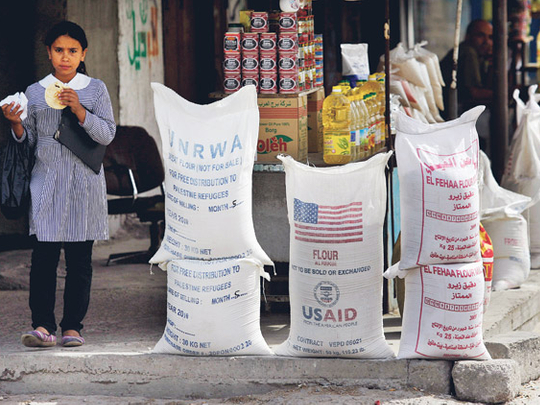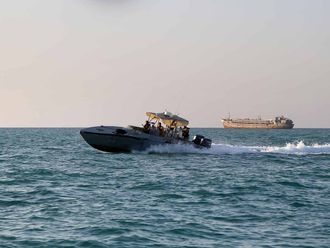
Rafah: Israel's siege on the Gaza Strip "must be broken," Arab League chief Amr Mousa said Sunday on his first-ever trip to the territory languishing under a four-year blockade.
"This blockade, which we are all here to confront, must be broken and the position of the Arab League is clear," Mousa said after being welcomed at the Rafah border crossing with Egypt by officials from many Palestinian factions.
"Not only the Arabs, but the entire world should stand with the Palestinian people against the siege of Gaza and what is happening in the occupied territories, especially [occupied] east Jerusalem," he said, referring to a surge in Jewish colonies in the annexed Arab half of the city.
Mousa's visit came just two weeks after Israel commandos staged a botched raid on a fleet of international aid ships seeking to run the blockade, which left nine Turkish activists dead and scores injured.
It was the first time a secretary general of the 22-member pan-Arab organisation had visited the besieged coastal Strip, which was taken over by Hamas in June 2007 after the Islamist movement ousted the secular Fatah faction of Palestinian president Mahmoud Abbas.
The 10-hour visit, announced shortly after the deadly flotilla raid, was aimed at "showing solidarity with the Palestinian people" in the face of the blockade and to urge greater efforts to reconcile deeply divided Palestinian factions, top aide Hesham Yousuf told AFP last week.
Speaking to journalists at the crossing, Mousa reiterated calls for Hamas and Fatah to resolve their differences.
"Reconciliation is the basic and principle question. It is a question of will and not a mere signature - it's a will, it's a policy, it's a position that translates into an agreement on all issues," he said.
"History does not halt before a sentence here or a paragraph there."
During the visit, Mousa was expected to hold talks with Hamas prime minister Esmail Haniya as well as other faction heads, the United Nations, local business leaders and non-governmental organisations.
He was also expected to meet with families who were bereaved during Israel's devastating war on the tiny coastal strip, which began at the end of 2008 and left some 1,400 Palestinians and 13 Israelis dead as the Jewish state sought to halt rocket attacks.
Gaza's 1.5 million inhabitants have been hit by a crippling Israeli-Egyptian blockade imposed on the territory in June 2006 after fighters captured Israeli soldier Gilad Shalit in a deadly cross-border raid.
The blockade was later tightened a year later after Hamas seized control of the enclave.
Two weeks ago, a six-ship flotilla carrying 10,000 tonnes of aid tried to run the blockade and reach Gaza, but was stormed by Israeli navy seals in an operation which left nine dead and scores injured, among them seven Israeli troops.
The raid provoked a backlash of anger against Israel, which is now under increasing pressure to lift its naval blockade of the territory.
International fury over the blockade also had a galvanizing effect on Cairo, which quickly moved to reopen the Rafah crossing just days after the raid, allowing travellers and humanitarian aid to pass, but not any commercial goods.
Israel has said the closure is necessary to prevent Hamas from importing weapons and insists the humanitarian needs of Gaza's people are met by the dozens of truckloads of basic goods it allows in most days.












